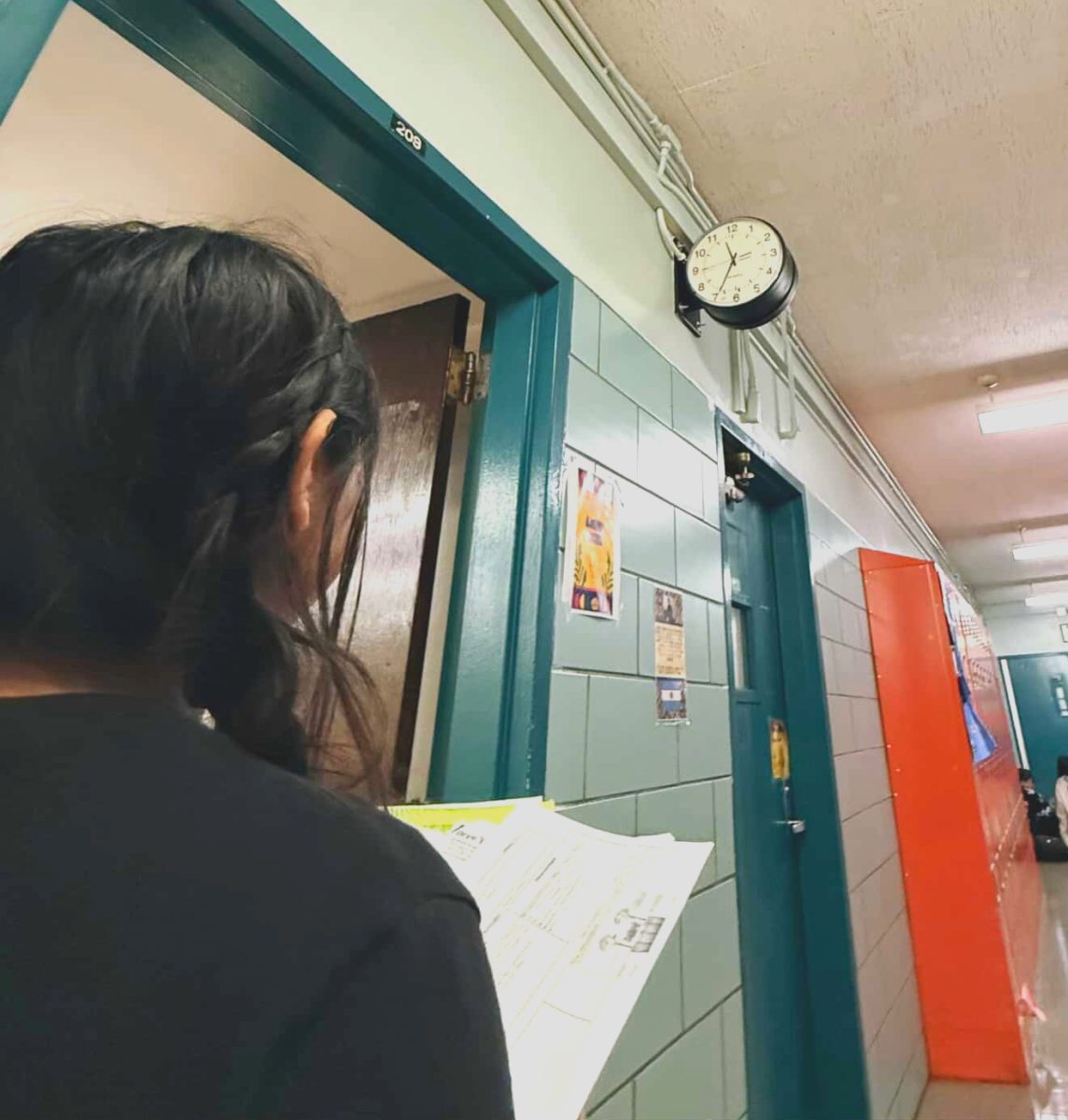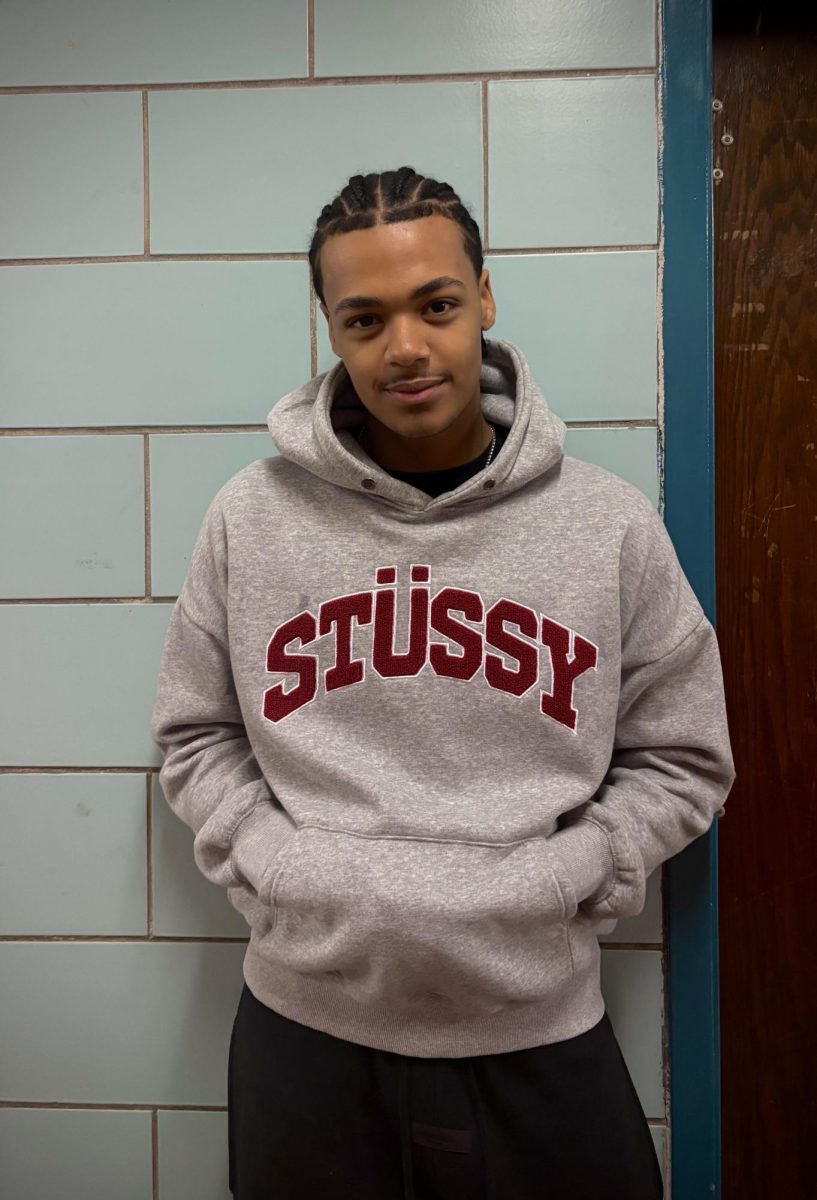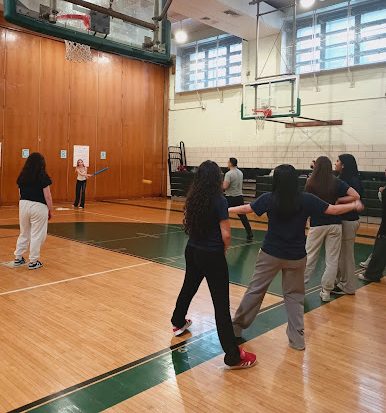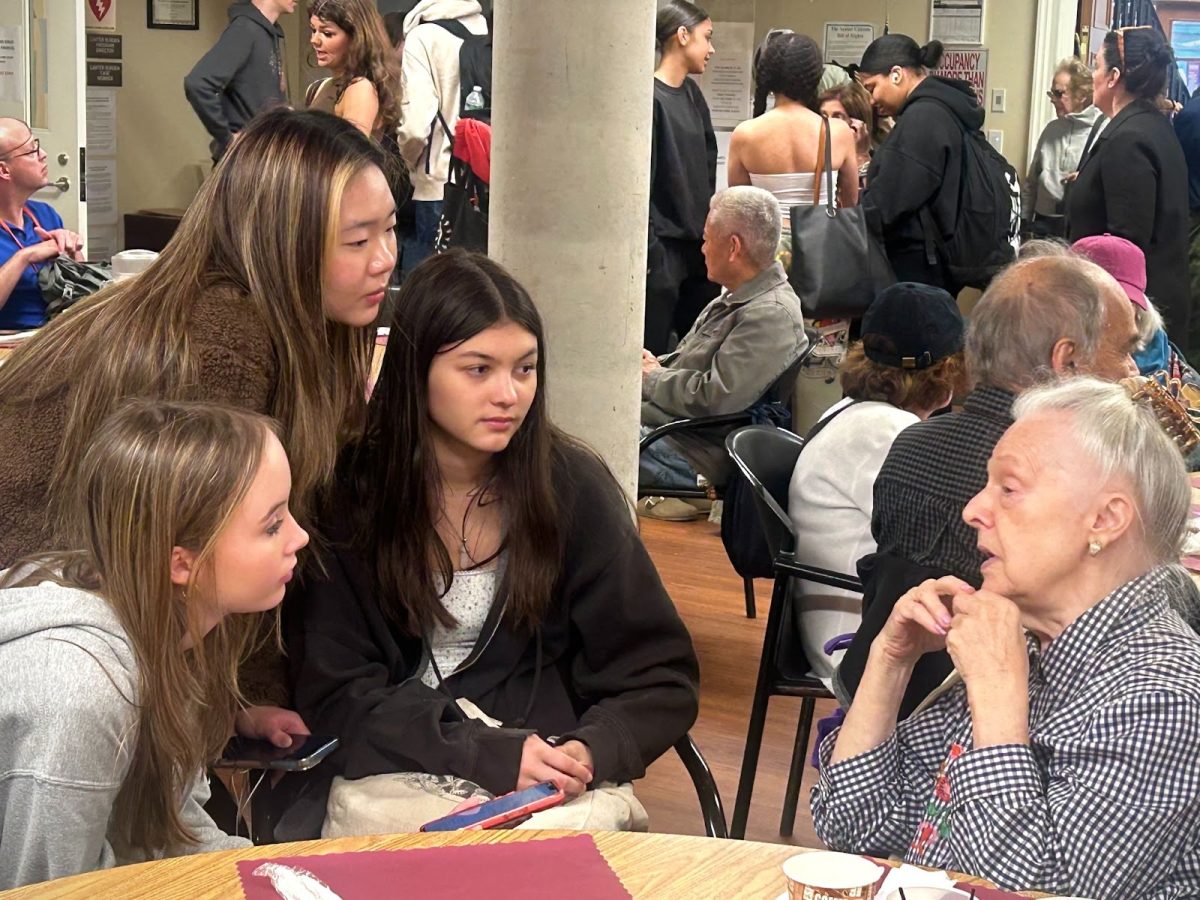What We Can Learn From Strangers
November 16, 2022
The human race is inherently selfish. Seldom do we take the time to think about other people, to consider their opinions, thoughts, feelings. We go about our days half heartedly listening to other people, usually preoccupied by our own problems. Humans often find ways to blame the universe and others for their issues, creating a man v. society ideology. But is this thinking actually disrupting us from the honest truth, one which is really man v. self? Do we sabotage ourselves just by ignoring the voices of our peers, or strangers we’ve never spoken to? We can learn more from strangers by talking to them– and fully listening– stepping out of the bubbles that surround us, filled with a fog of personal interest.
To launch my research into this topic I developed questions to ask people. As this is a topic that I want a plethora of people to relate to, I had to keep these questions relatively vague– focusing on things I felt could be understood universally. Once I formulated my list, it was time to speak with people. Strangers, specifically.
Eventually, I found my first interviewee. Maria Dusovitsksya was sitting alone, contently eating her Sweetgreen salad. I approached her, introducing myself and the topic, and she warmly offered me a seat at the table.
As I spoke with her, I acknowledged the irony of talking to a stranger and wanting to connect her stories back to my own life rather than digesting experiences that I am unfamiliar with. We cannot blame our brains for thinking in ways society has manipulated. I am automatically wired to attempt to make a situation about me, believing it’s easier to focus on myself rather than try to understand what other people experience having nothing to do with me. Even without consciously trying to relate, I still felt relatively connected to this woman I had met maybe fifteen minutes prior. There is a comfort in knowing you are not alone with your own experiences..
One of the questions I asked Maria was if she had any advice she would want to give her high school self, or any high schooler in general. She expressed the importance of feeling confident enough to take on new adventures. When she first developed this keen sense for adventure, she was in college. She stated that it brought wonderful things into her life. However, as the anxiety-ridden high school student that I am, and I know other people are, I had to ask her an important question. What happens if you try something new, have an adventure, etc., but you make a mistake? What if you made the wrong decision, and now you feel like you don’t know where to go from there? How can you leap blindly into a decision when you don’t know what the outcome will be? And she gave me one very simple answer. One sentence.
“It’s never too late to start over.”
Maria works in the arts (specifically with a team who design museums and exhibitions at the moment), but this has not been her only job. She has had many other careers, and she says she is always looking for new things to do. If she wants to do something, she does it. She is not afraid to revise her path or change her mind on what she wants to do at any given moment, and I find that inspiring. From such a young age, we are always asked what do you want to do when you grow up?, but we aren’t given the option to say everything. What if I wanted to do everything?
Maria embodies this daring spirit excellently, taking initiative for her own happiness, and setting the example that it’s okay to change your mind about your path; but if you are unhappy with where you’re headed, you have to be the one to then tailor your life to what you want. This line that she gave has lingered with me for the past few days. Although it doesn’t completely revoke anxieties surrounding taking risks, or just doing anything at all, it does alleviate some of the tension.
There was a second part of this advice she gave, which I believe is equally important.
She said, “… life takes me to where I’m supposed to be, and if I just listen, I’ll be in the right place at the right time.”
There is an aspect of trust that has to be placed in yourself and the universe. Trust yourself, your gut, your instinct. The majority of the time, you will be right about topics concerning yourself.
By talking with her, I was able to recognize the unhealthy patterns of thought I have, in which I expect the universe to do everything for me. There is this idea that what is meant to be will be. I don’t disagree with this, but it also cannot be expected that you can just sit around being miserable, waiting for life to change its course for you. These backseat thoughts were submerged and became conscious through this discussion.
The next day, my friend and I were walking near Union Square, and I mentioned having to do an interview. She nodded toward a man sitting in the Pret a Manger, eating a sandwich. I agreed.
After the formalities, we sat with this man, who opted to be referred to by his initials, “NH.” We spoke about his past, present, and future. Having grown up in the United Kingdom, he had a very different life than someone in the United States. At the beginning of most of the interviews I conducted, I asked people what makes them happy. A simple question, yes, but a question that reigns important to the human race. When I asked NH this question, he had an answer almost immediately. He wants peace of mind. We all want peace of mind, it’s what we do to gain it that’s important. So I asked him. How does he take charge of his happiness?.
NH replied, “You know, I do the basics. Walking, running… drinking alcohol.”
My friend and I got a giggle out of that.
I brought up the idea of the stigmatization surrounding aging, after he expressed his upset about his hair graying. This is a short excerpt of our conversation:
Me: In our society, aging has a stigmatization around it, putting it into a light as something to be frowned upon. What are your thoughts on aging?
NH: Well I have no choice. I don’t want my life to end but, there’s nothing you can do about it. …[personal story] … to get back to your aging thing, you just have to… –
Me: It’s not something to fight.
NH: Yeah.
At 71 years old, NH has more experience with aging and death than me and my friend who are only fifteen and sixteen. This sparked a conversation about near death experiences, which NH had a great story to tell about.
In 1972 he first came to America with his band (he is a musician to this day). He was staying at a hotel in New York City, when there was a building fire. He was trapped in his hotel room with a stranger as his building went up in flames. He got out alright, evidently, but it was still a scarring experience. Obviously, I had questions. I had one in particular, and I didn’t get the answer I expected, but I still like what he said.
Me: When you were going through that, and I know this sounds cliché, but is there anything you wished you had done or was different in your life?
NH: No, no, not really more… hm… –
Me: I am going to die here, I want to be alive?
NH: Yeah yeah exactly. You know I had accepted death. … I thought I was dying. It felt like drowning.
These are the stories we can hear from people. The experiences we can learn about. The empathy that increases for people. The way our thinking evolves outside of ourselves.
We touched base on age once more. Prompted by one of my planned questions, it is a very sincere and warm way to end his section.
Me: Are you happy? Just in general. Are you happy?
NH: Absolutely. Totally. 100% happy. Happier than I ever thought I would be. Because getting old isn’t that bad. It’s not that bad.
And it’s not. It’s scary growing up, yes. Change is difficult, especially when everyone else around you is changing at the same time; but it’s not bad. Getting old means that you’re not dead. Getting old is a gift, not an annoyance. Yes, you will die– but doesn’t that just give you all the more reason to live?
Wandering around my neighborhood in an effort to find someone in a cafe to speak with, I saw someone sitting alone, reading a book. I was a bit uneasy (I don’t love when people disrupt my reading), but I went up to her anyway. In doing so, I met Lauren, a twenty-seven year old graduate from Penn State, where she majored in musical theater. She does some work in musical theater alongside work with a youth mental health nonprofit, called the Youth Mental Health Project.
We talked for about an hour, and half of the questions I had prepared weren’t even brought up. Don’t mistake this for a failed interview, though. This was definitely one of my more successful interviews, in which I really felt connected, open, and thoroughly honest with my interlocutor.
We cycled through a myriad of topics, including (but not limited to), mental health, relationships, stigmatization around things like sexual education, love, friendships, etc. While all these topics were interesting to talk about, our conversations about love and relationships were what really stuck out in our time talking together. Love, lust, relationships, and genuine human connection is one of the most prominent aspects of the human race.
This topic popped up when I asked her if she was in love. She said yes, she is in love with her boyfriend of eight months, and she had been in love before him, too. This was a perfect segway into one of my more favorite questions, who was your first love and why did you love them?
When I asked the question, Lauren juggled between her high school boyfriend of four years versus her college boyfriend. Unsure, she settled on her first love being her college boyfriend, and gave me a list of reasons why to her, it was love.
“Everyday I felt that he and I just appreciated each other so much, and a very similar idea to my relationship with A (her current boyfriend). that we cared for each other the way that we needed to, and there was this constant balance of ‘Ok, maybe you’re having a harder time than I am right now and I’m going to show up for you’ …” And vice versa.
I felt this quote of her’s was beautiful and got to the essence of the things that build and maintain a relationship. It describes that feeling of just complete caring for one another. There was one more thing she said that I felt would resonate with a teenager, or a highschool student in a relationship. This is a longer piece from our back and forth:
Lauren: If there is that fight or if you have to ask the question and convince yourself ‘Oh does this person want me in their life?’ ‘Oh do they like me?’ ‘Are they in love with me?’ Then those feelings can grow, but I think true love connection … happens naturally.
Me: And you said you work with people with mental health, and you have anxiety yourself, do you think that it’s the same for people with anxiety who tend to very much overthink everything?
Lauren: So that’s why you need to find somebody who can care for you the way that you need to be cared for.
I think that last line has so much emotional importance that anyone in a relationship of any form can apply to themselves. The concept of caring for someone in ways they need to be cared for, not the ways in which you want to care for them.
You deserve to be appreciated and loved in a certain way that is beneficial to you, not the way that maybe the counterpart likes most. She continued to explain that there was reassurance of just being there for one another and showing up. To love somebody isn’t to say “I love you,” it’s to care, to listen, to trust, to respect, to communicate, and all of these things that build and strengthen a relationship.
I then opened the conversation back up more to where we were prior– in the debate of “first love.” There’s a misconception about love that circulates: just because a love that you feel for someone is different or heavier than a previous one, doesn’t mean that all of the prior loves get canceled out.
I urged Lauren to think of her high school boyfriend as her first love. Even if it wasn’t true. She let me into their personal lives together, what was right, what was wrong, and what just was. They were together when he lost his father. She loved him as much as one could in high school, recognizing that although her feelings were deeper for her college boyfriend, it didn’t negate the love she felt for her high school one. She said that what inevitably ended their relationship was that he loved her so much that all he wanted to do was protect her. In doing so, he ended up pushing her away instead.
“He felt this fear that he was going to lose me, so he did everything that he could possibly think of, to kind of keep me for as long as he could. … That’s the only way that he felt he could keep the love going.”
Lauren and I decided that what is important in relationships is remembering that there is still MY life, there is YOUR life, but now there is an additional OUR life. The separation is important, because when it gets too intertwined it can get messy.
It is okay to have things separate from your partner, and it is okay for them to have things separate from you. Other people I talked to also admitted to having some regrets and embarrassments about being possessive and jealous. There is a common belief that your sufferings and challenges are foreign to other people, that they’ll receive immediate judgment for experiencing these emotions. Once there is the realization that opening up can only make you feel less isolated, only then can we begin to heal. It’s inevitable that we are going to experience feeling like this at points in our lives, but it’s important to recognize it, recognize its stem, and how we can move past it.
Finally, a piece of advice Lauren would want to give a high school student:
“You don’t need to change who you are to fit into the places that you’re meant for.”
Talking to Lauren was so comforting, listening to, and taking her advice actually helped open my eyes to some of my own faults. Speaking with her solidified how by talking to strangers, not only can we learn, but we can form bonds and relationships. These don’t have to be lifelong, they can quite literally last the span of a conversation. But they are still important. I have full confidence that things that seem insignificant, such as a ten minute conversation with a stranger, can cause us the greatest personal and mental growth.
On the last day of my interviews, I didn’t want to do them. I wanted to go home and lay in bed for the rest of the night. I didn’t feel like interacting with people, let alone strangers. Furthering my argument. I was feeling selfish. I didn’t want to think about anyone else’s problems, or the fact that I was potentially putting my editor behind schedule, because at that moment I wanted to believe my problems were the most important. The bubble we have surrounding ourselves, keeping the ideas of others out, also serves as protection, leaving it is uncomfortable. There were points in my interviews that were awkward. I was talking to strangers, after all. Nevertheless, through doing this, I learned many lessons that transcended my everyday experiences.
It takes a tremendous amount of energy to interact with people when you have no idea what will happen, and it takes double the energy to step outside of your personal interest bubble. It’s easier to want to pay attention to myself and not think about all the other people in the world.
On my last day of interviews, I walked past a girl standing behind the desk of a dry cleaners. I paused after passing, telling myself it would only take fifteen minutes, and walked in. There I met Isadora. She accepted my interview and was smiling the entire time. We covered many topics, but what most stuck out to me was our conversations on where her happiness was coming from . Isadora, a recently twenty-one year old high school graduate, decided not to go to college; an unconventional path for most, if not all people are encouraged to go to college from a young age.
Despite the fears instilled on us about what may happen if you don’t attend college, Isadora is thriving. She plans to soon move to Brazil, leaving her parents, leaving New York (her hometown). She said that once she got out of high school, she immediately started working. Saving up money so she could do what she wanted without the limitations of a four year program.
When I asked if she had any advice for a high school student, her answer stayed within this realm of higher education and the societal compulsion to go to college and follow this one strict path.
She answered, “… I feel like it’s very easy to kind of fall into the social pressure that you have to do this one thing, which is to go to college. And maybe this works for a lot of people, you know if you have a certain path in your life, if you want to be a doctor, if you want to be a lawyer– and college is necessary for that– I think you should definitely go for that. But for those who are kind of just like, not sure what they want to do, or kind of just need time to figure it out, I’m very happy with the decision that I made.”
Knowing that people can stray from typical paths, succeed, and be genuinely happy, is reassuring for myself and I am sure many others. Whether you have an ideal life plan or you’re still figuring it out, there’s comfort in knowing that whatever happens, you can always build yourself up. You can always be happy where you are. You are never “too far gone” to reshape what you’re doing, or just build onto it (similar to what I spoke about in the first interview).
The second girl I interviewed for this happiness aspect is named Delphina. I met her in the grocery store whilst running a few errands. I asked her if she had a few minutes to chat, she said yes. Only taking about ten minutes, this fifteen year old girl and I were able to discuss the idea of happiness.
When I asked her what makes her happy, she spoke a lot about other people. Hanging out with her friends, watching TV with her brother, etc. This brought up a question that’s been dancing in the back of my mind for a little while: do I need other people to be happy? So I asked her.
Me: You’re talking a lot about other people, and the transfer of energy– specifically happy– from one person to another. Do you think you’re able to be happy without being around other people?
Delphina: In short, yes. I have personally struggled with this, because I feel when I’m alone it’s easy to fall into places of my mind I don’t like. But the longer I spend rejecting these parts of myself, the more resentment grows. When I really sit on my own and be present in my own mind, I can enjoy being with myself.
After hearing this, I was a bit in awe. It’s one of those things where you think it, but you’re not sure if saying it aloud would get you labeled crazy or praised.
With these two interviews, I learnt one main thing. Happiness comes from yourself. It depends on you to decide what you need, what you want, and how you can achieve these things. If you want to be happy, you have to learn how to be alone with yourself. You need to recognize your personal needs, outside the standards and idealizations of others.
Through speaking with strangers, my argument was advanced. Proven, even. I was able to highlight four characteristics of the human race, and further our knowledge on them. Every soul thinks and processes things differently, even if it’s just by a little.
To believe we know best out of everyone is wholly ignorant. We are delaying growth as a society, being detrimental to not only ourselves but the next generations, and overall causing mass incomprehension of how life works. It is selfish. It is vain. It is vain to believe that no one will help advance your understanding of basic topics. It is selfish to use this as reasoning to not reach out or hear other opinions, causing a downward spiral of those being affected by you, direct and indirectly. You’re not alone.
When your bubble becomes clouded with personal interest, fear, insecurities, and problems, it becomes all you see. By leaving this safety zone, you become exposed to the rest of the world. Everyone else, struggling with things similar to you. The world is scary, yes. But what is scarier is living your life hunched over in the corner, breathing quietly so as to not gain the attention of others. To weep alone in your misery. The world contains hurt, but it also contains so much color.
Overall, my reason for writing this piece shifted. It became less about proving my point, and more about letting other people be heard. I hope you, the reader, also learned something from this. And I hope you can find an outlet where you too can be heard.




























mannat kaur • Nov 18, 2022 at 7:53 pm
this is a great article julia!
scarlett • Nov 16, 2022 at 4:16 pm
this was so interesting, i’ve never even considered the lives of strangers around me so this article really put everything in perspective
Naomi • Nov 16, 2022 at 12:58 pm
this so cute julia good job